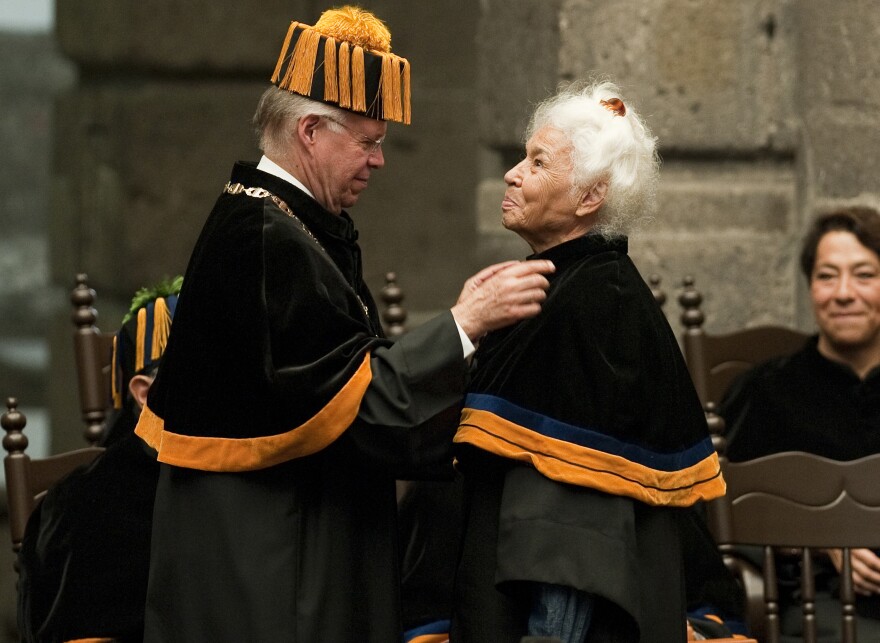After decades of fighting the patriarchy – enduring death threats, censorship, exile and imprisonment – Nawal El Saadawi died of natural causes in Cairo on March 21, outliving the two Egyptian presidents who tried to silence her: her jailor, Anwar Sadat and her censor, Hosni Mubarak. She was 89.
El Saadawi was the loudest voice for women's rights in the Arab world. Modern Egyptian feminists like journalist Mona Eltahawy consider her the "godmother" of the current feminist revolution galvanizing in Egypt.
"She is a reminder that feminism is indigenous to the region and not something we need to import," says Eltahawy, author of the newsletter, Feminist Giant. "Her fight against patriarchy will live on."
A feminist from an early age, El Saadawi blackened her teeth to ward off potential suitors when her parents tried to marry her off at 10 years old.
Later, she married and divorced three husbands of her own accord, and proclaimed with pride in a 2015 interview with The Guardian that she was "not really fit for the role of a wife."
Her daughter, Mona Helmi, from her first marriage to Ahmed Helmi, is a writer and activist like her mother. Her son, Atef Hatata, from her last marriage to Sherif Hatata, is a filmmaker.
El Saadawi wanted to be a writer, but her parents convinced her to be a doctor, so she went to medical school.
"I've written all my life," she said in a 2011 interview published by e-flux. "What really encouraged me to write was my dissatisfaction with my surroundings."

It was her work as a doctor in her own village of Kafr Tahla that allowed her to witness the widespread inequalities and oppression endured by rural women.
When El Saadawi spoke out against female genital mutilation – a practice she criticized in Women and Sex – she was immediately stripped of her position as director of the Ministry of Public Health. She chronicled her own traumatic experience with genital mutilation when she was 6 years old in her book, The Hidden Face of Eve.
Her most famous novel, Woman at Point Zero, inspired by a sex worker on death row who killed her pimp in self-defense, motivated Eltahawy to write and protest against the Egyptian military regime and its patriarchy.
"She inspired me to be savage and dangerous in telling the truth as her life clearly showed," Eltahawy told NPR in an interview March 24. "And when the regime sent riot police to get me in 2011 near Tahrir Square, and they broke my arms and sexually assaulted me, I understood the price of being savage and dangerous."
El Saadawi also spoke out openly against the lack of democracy and freedom in Anwar Sadat's regime, and was imprisoned for two months in 1981 along with nearly 1,600 other dissidents in a series of arrests made in his final month of office.
Behind bars, she wrote her prison memoirs with black eyeliner and toilet paper that was smuggled to her by fellow prisoners, and formed the Arab Women Solidarity Association that promoted the participation of women in social, economic, cultural and political life.
After Sadat's assassination, she was released from prison only to face death threats by Muslim extremists. When then-president Hosni Mubarak imposed armed guards for her protection, she refused them, and went into exile in the United States in 1993, returning to Egypt in 1996.
Fiercer with age, El Saadawi made a run for president against long-time incumbent Mubarak in the 2005 election. He restricted her public appearances, seriously hindering her campaign. In 2011, she protested his regime in Tahrir Square.
El Saadawi wrote over 50 books including plays, short stories, fiction and nonfiction despite censorship, death threats and even imprisonment.
"When I was in jail, the jailer said, 'If I find paper and pen in your cell, it's more dangerous than if I find a gun," said El Saadawi in a 2018 interview with Reuters "I have lost my fear of death, I have lost my fear of prison.
Copyright 2021 NPR. To see more, visit https://www.npr.org.


